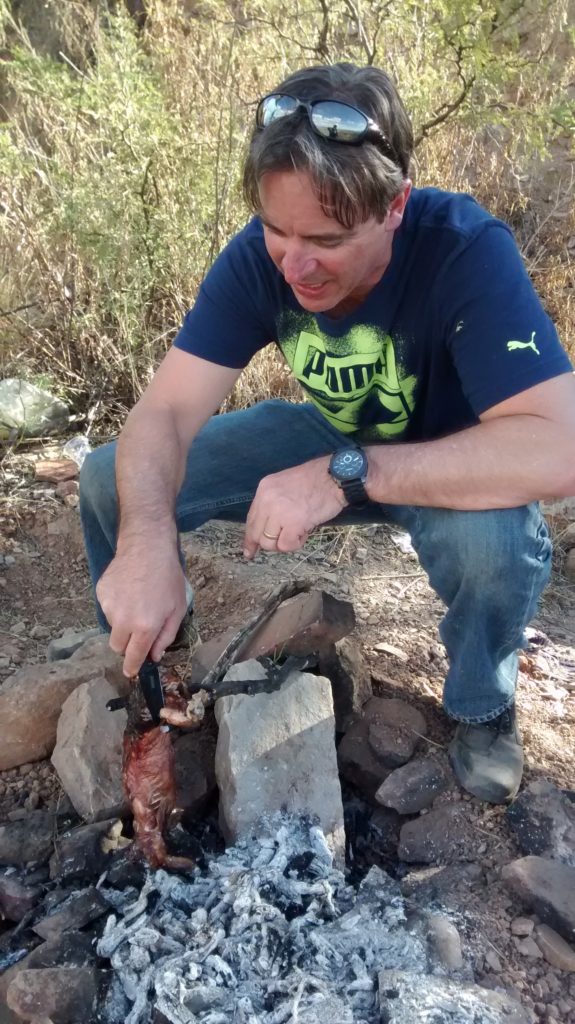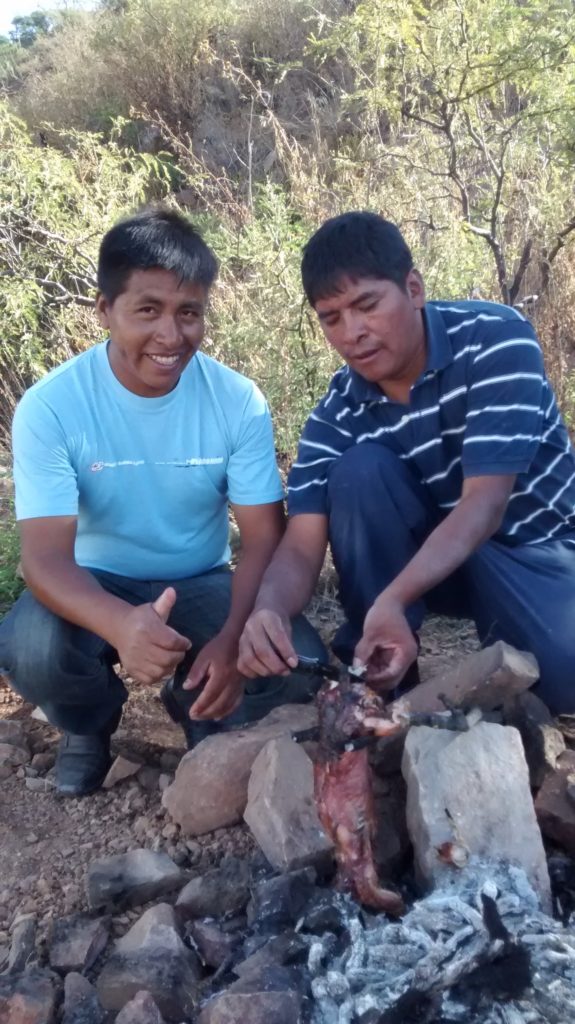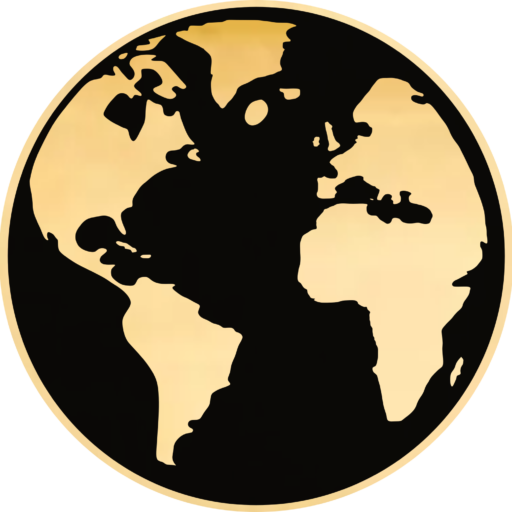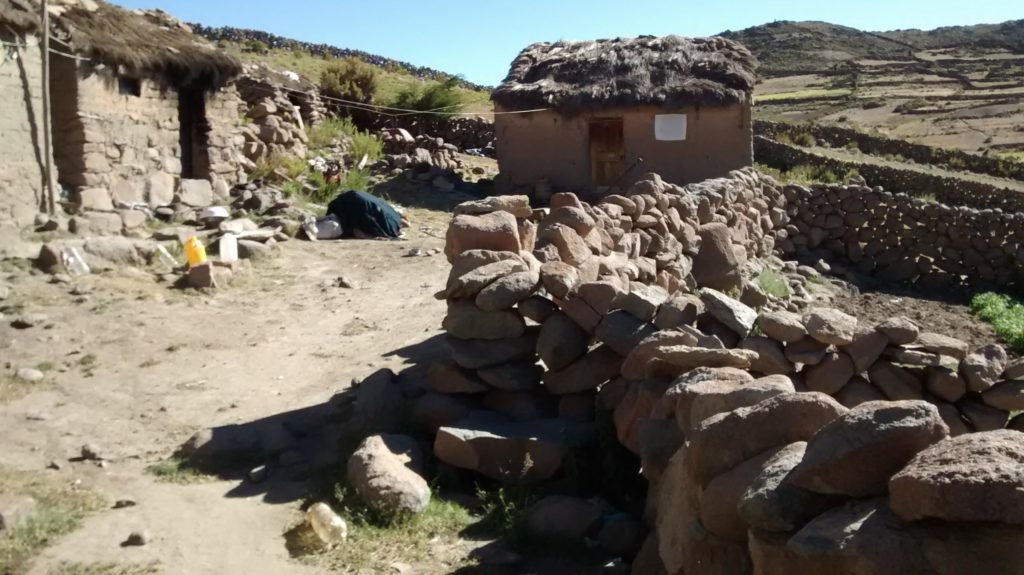
Recap
My friend and assistant in Bolivia, Elias has told me many stories of his childhood and life growing up in his village. I had always wanted to go there and visit, so when our first patient, Agustin, turned out to be from that village, I figured this would be a good time to go. Initially, Agustin and his family had come to us in Cochabamba. After his test socket was made, he was planning on returning to Cochabamba to try the new leg, but a tragic accident prevented him from coming. His wife Celia had been working out in the fields and was struck by lightning. She wasn’t killed, thank God, but she was bedridden. Elias and I thought that if Agustin couldn’t come to us, then we would go to him. This would also give Elias a chance to see his family and show me his village. So, we planned our adventure. Elias’ cousin Mateo, who was also from this village, decided he would drive us. We thought it would be a good idea to have help with our first patient, so we enlisted Florencio, a Bolivian trained in prosthetics and wanting to volunteer, to come along.
Business as Usual
It was a long, 7-hour drive to get there, but it was an unfamiliar part of Bolivia, so everything was new. My difficulty in breathing and thumping headache was a reminder that the altiplano was about 12,000 feet above sea level. It didn’t matter though. The beautiful scenery of the llamas and mountains took my mind off my problems. We finally neared the village, and I was getting anxious to be there.
As we pulled up to Agustin’s house, he and his family gave us a warm welcome. The village was bustling with activity and there were people everywhere. Agustin told us that there was a three-day event happening and that people had come from neighboring villages for the festivities that included a big three-day soccer tournament. The day before, then-president Evo Morales had even been there to dedicate a new sports facility. There was so much to see and do so we figured it would be best to get busy with Agustin. With Florencio, Elias, and myself working on his new leg, we were able to get it fit on him and in no time, he was up and walking. We were very happy with how everything turned out and I breathed a sigh of relief and thanked God.
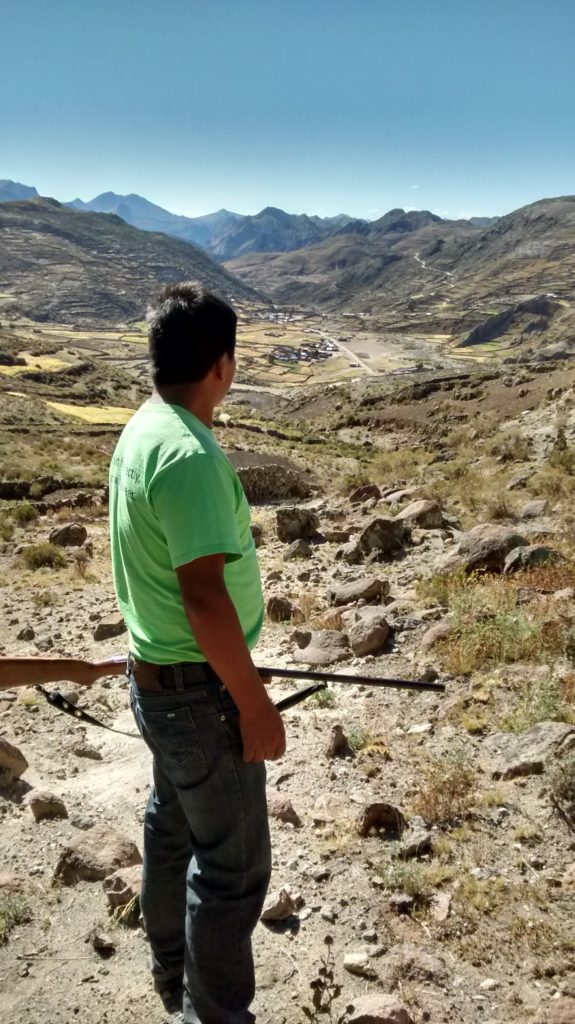
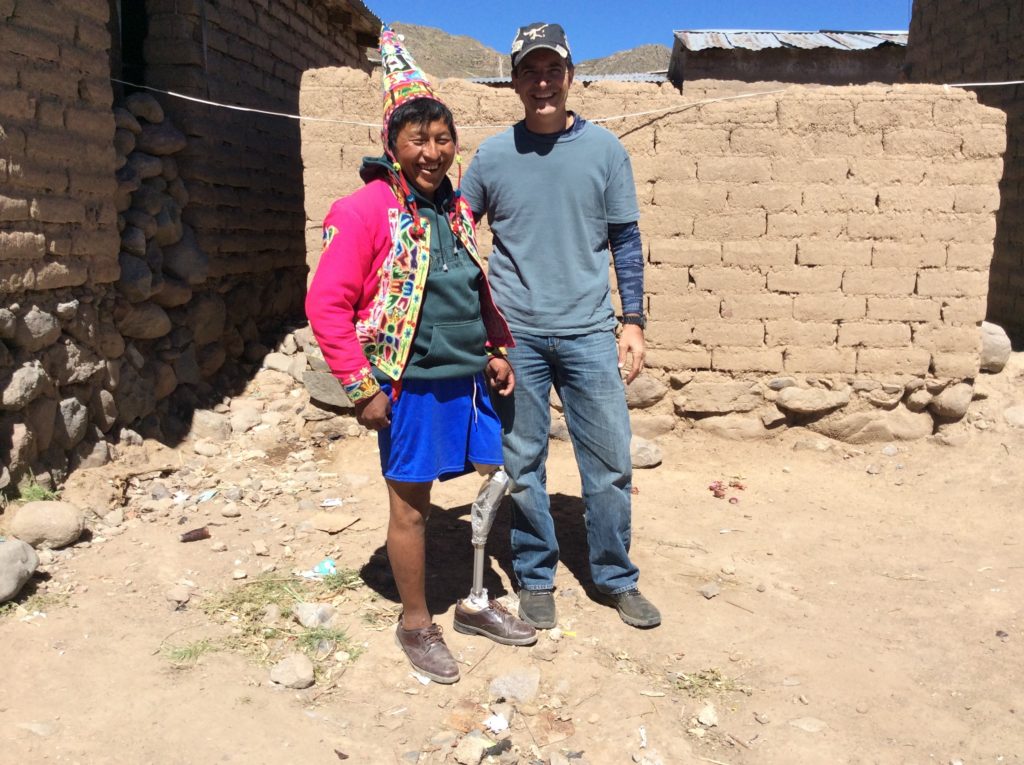
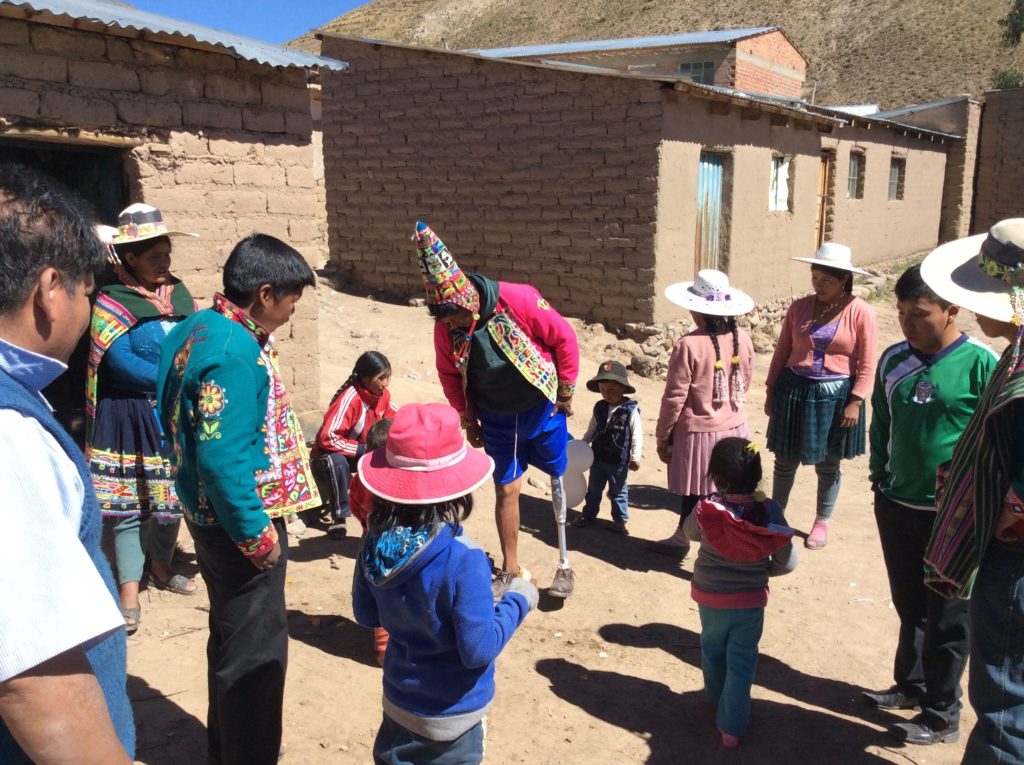
We walked down to the field where the soccer tournament was going on and wow, the place was packed! It was lunch time and there were some delicious smells coming from the booths of the vendors. My stomach was growling so Elias grabbed us each a plate of one of his favorite foods, Charque, which is llama meat prepared in the ancestral way; cutting the meat into strips, salting it and leaving it to dry in the sun. It tasted pretty much like beef jerky but topped with a peanut sauce and a side of potatoes, it was delicious!
Walking further, Elias and Mateo saw a lot of old friends, so they went off to talk to them. Florencio and I talked, ate our food and watched the tournament. I looked around at all the people and realized that I was the only gringo in the whole village, and I stuck out like a sore thumb. I just tried to stay hidden behind my baseball hat and sunglasses. Danée and I travel a lot and we are in situations like this on every trip we take, so we’ve become accustomed to being stared at. But something this time felt different, and not in a good way. There was tension in the air, and I had no idea why. People were whispering to each other as they pointed at me. I saw Elias and a friend talking and the friend was pointing at me. Okay, now I was starting to feel self-conscious. As soon as the friend left Elias, I went and asked him the reason for all the weirdness. “It’s nothing. They just wanted to know who you were and why you were here.”
No restaurants, not even a food truck…
Aside from the weirdness of being pointed at (and stared at) all morning, I was having a great time. We had gone to see Elias’ childhood home and now we were getting ready to go hunting. Elias assured me that there were plenty of viscacha to be caught. Viscacha look similar to rabbits and live among the rocks and ledges of the Andes mountains. We were hoping to see a lot of them because this was going to be our lunch on the way home. There wasn’t any place to stop between here and Cochabamba, so we planned on pulling over somewhere to light a fire and cook whatever we shot. I hunted for a couple of hours with Elias before I had to stop. Climbing around the steep rocky cliffs at high elevations was doing a number on my knees and lungs. Add to the fact that we’d only seen two viscachas, and I was ready to let someone else have a turn. We pulled the truck off the mountain road in a nice, shaded area and Florencio and I took a much-needed siesta while Elias and Mateo continued hunting.
There was only one road in and out of the village and there were quite a few cars passing by us. I noticed that many of these cars seemed out of place for this remote area. I’m talking high-end, very expensive cars driving in and out on this gravel, mountain road. When I asked Florencio who could afford such expensive cars like this, his reply startled me. It seems that many villages like this have lucrative drug operations. Bolivia is the second largest producer of coca leaves behind Peru and even though it is legally used in medicinal purposes, it is also used in the illegal production of cocaine. Villagers can make a lot of money in setting up cocaine labs and many do so without fear of police or narcotic officers because officers know that trying to enter a village to shut down production can be a death sentence for them. Villagers are known to kill anyone who is considered a threat to their business.
Almost on cue after he told me this, a car went by, and the occupants rolled down their windows and were shouting at us. They spoke the indigenous language Quechua, and I couldn’t understand but it didn’t seem friendly. Florencio, who speaks Quechua, told me they were saying that we shouldn’t be here. “Okay”, I thought, “I don’t want to be here right now either!” Not long after, another car went by, and then another, each yelling at us to leave. I started to have a bad feeling and anxiously looked around for Elias and Mateo, wondering if they’d be back soon. As the sun ducked behind the mountains, it started getting a little chilly and I figured they’d be walking in anytime now and we could leave. Just then, a large passenger van drove by slowly and everyone inside was eerily waving to us. As it drove out of sight, I breathed a sigh of relief. Then, I heard it stop. My pulse quickened as I heard it back up and then come to a stop right by our truck. Florencio told me not to say anything, but to let him do the talking. The occupants all piled out of the van and gathered around me and Florencio. A couple of them had large sticks in their hands. They wanted to know who we were and what we were doing there. Florencio explained to them that we had been helping Agustin walk again. It wasn’t until we told them that we were there with Elias and Mateo that they stopped questioning us. They wanted to know when we were leaving and then thanked us for helping Agustin before driving off.
Elias and Mateo arrived just at dark and with only one viscacha, I might add! They only laughed when I told them what just happened, but corroborated what Florencio had told me about the drug production and how outsiders have gotten killed when they are considered a threat. It’s always good to have some stories banked up to tell future grandkids, but that may have been a little close and I silently thanked God for His protection.
We felt it was best to stay overnight in a neighboring city, so we drove two hours to Oruro and got a hotel for the night. The next day we drove until lunch time and like we had planned, pulled off the road and cooked our viscacha over a fire. With that, together with cheese and roasted potatoes that we had bought in the village, we ate like kings.
A few days later, Elias and I were together, and he told me his dad had called him from the village with a request, or really, more of a warning. The next time he wanted to bring a gringo into the village, he needed to let the mayor of the village know and get permission. Apparently, the villagers all thought that I was a Drug Enforcement Agent from the USA, and they were very nervous. My baseball cap and dark sunglasses had convinced them! They actually shut down drug production for three days because of my presence there. It was then I knew just how serious a situation it had been: these guys don’t mess around. God had protected me and for that I am grateful!
